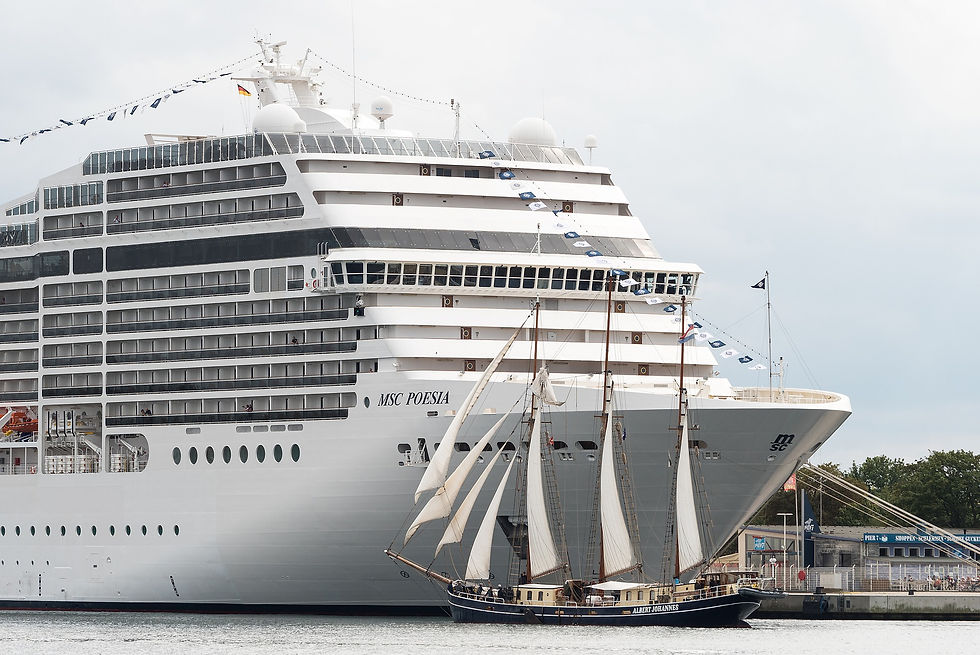Smooth Sailing: the Future of Cruising
- Anand Mehta
- Feb 25, 2021
- 3 min read
Updated: Mar 22, 2021
Audience: High School students
When asked to picture a cruise ship, most people imagine the large and energy-consuming floating cities, spewing smoke from their funnels as they sail down the open seas. Although on the surface, cruise ships may seem like brilliant ways to enjoy a vacation, environmental concerns have been pressuring companies to shut down their ships due to the vast amounts of pollution they cause.

A cruise ship at a harbor, loading passengers, supplies, and fuel. Photo by hpgruesen from Pixabay.
Recently, the British P&O cruise line unveiled their latest ship, the M.S. Iona. This event was significant for several reasons; not only was it the largest ship that the company had made, with a capacity of thousands of people, but it was also the first of a series of cruise ships to run exclusively on Liquified Natural Gas (LNG), an environmentally conscious and progressive move for the company. LNG is a gas cooled to a liquid state for the purposes of energy consumption. The P&O Cruises’ decision to have their new ship run on LNG represents a major shift in the cruise industry and their method of fueling their large ships.
In the past, the cruise industry has faced multiple allegations of environmental harm and damage.
Allegations have increased as regulations become stricter. Companies such as the American Carnival Cruise Lines, with over a hundred ships in their fleet, are major contributors to the pollution of oceans and other bodies of water. In 2018, a German survey found that the cruise industry caused some of the dirtiest forms of pollution due to its high concentration of waste—non-recyclable materials and GHG (greenhouse gas) emissions including methane and carbon.
Carnival Corporation was also charged millions in fines for the deliberate dumping of various excess waste in parts of Europe, particularly the Mediterranean, which brought many flaws about the cruise industry to light. Pressure from governments and the United Nations began the innovation of a new type of fuel for cruise ships: liquified natural gas.
Carnival began to develop a new ship based on this fuel, given the many benefits LNG presented, including cost-effectiveness. Carnival has begun a massive effort to build new LNG-fueled ships, aiming to drive environmental change. Since the launching of the first ship, the AIDANova, in 2018, twenty new ships have been launched using this new liquified natural gas technology.
According to a U.S. report, “LNG releases absolutely zero sulfur, 99% less particulate emissions (which have been noted as the cause of cancer in some patients), 85% fewer Nitrogen Oxide emissions, and 25% less greenhouse gas emissions.” LNG also requires half of the amount of tank storage space when compared to traditional diesel, making it more sustainable for the industry and allowing for more structure and efficiency in ships. However, the need for cool temperatures to transport the fuel is a downside, as it requires special technology to maintain the -162 degrees Celsius needed to keep the gas in a liquid state.
The rise of LNG in new cruise ship construction represents a shift in technological innovation, and a change in the once-static cruise ship industry, which had remained concrete in its use of unreliable and disastrous fossil fuels for decades. The future of cruise ships remains strong as these companies begin to transition to LNG, solving some of the greatest environmental challenges that cruise ship companies face today.
Bibliography
Energy, Department of. “Liquefied Natural Gas (LNG).” Energy.gov, US Department of Energy, 2019, www.energy.gov/fe/science-innovation/oil-gas/liquefied-natural-gas.
Hellenicshippingnews.. “Why More LNG-Powered Cruise Ships Are Being Built.” Hellenic Shipping News Worldwide, 24 July 2019, www.hellenicshippingnews.com/why-more-lng-powered-cruise-ships-are-being-built/.
“What Is LNG Gas, and What Are LNG-Powered Cruise Ships?” Cruise Reviews, Cruise Deals and Cruises - Cruise Critic, 2019, www.cruisecritic.com/articles.cfm?ID=5138.
Like and share this article! Also, follow our Instagram @stempower.us and subscribe to our YouTube channel here!





Comments